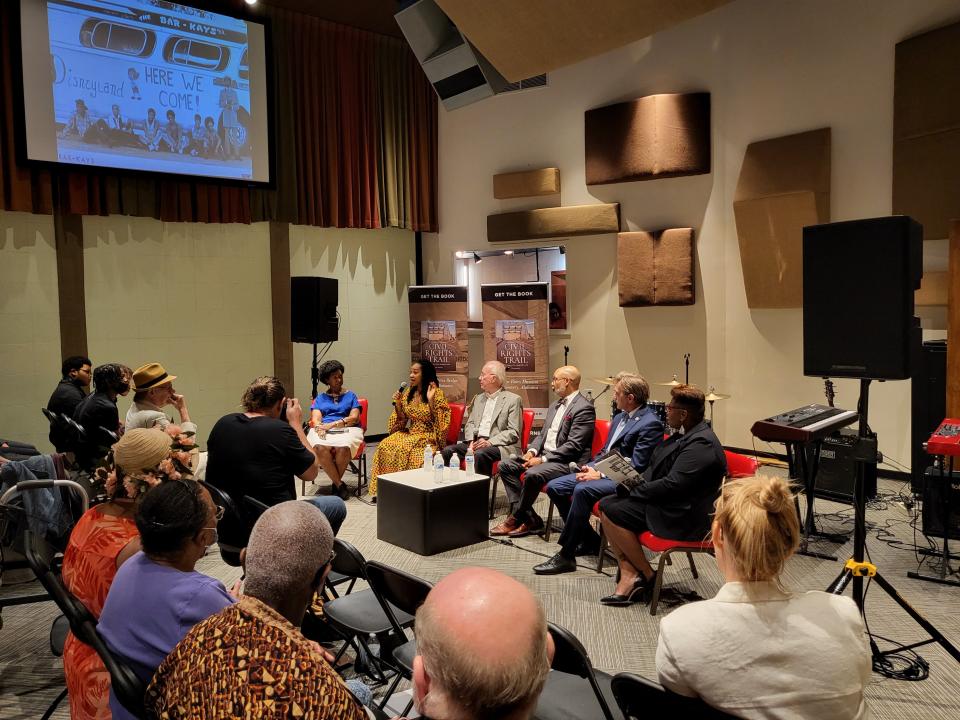Memphis and Tennessee tourism leaders discuss civil rights tourism during panel at Stax Museum
Stax Museum of American Soul Music hosted an event discussing the success of civil rights tourism in Memphis on Tuesday afternoon.
The program included a panel of local and state tourism leaders, a live performance from Stax Music Academy students and a book signing with panelist Lee Sentell, Alabama tourism director and author of "The Official U.S. Civil Rights Trail."
The program celebrates the addition of the Stax Museum to the U.S. Civil Rights Trail, a tour of places and landmarks in the South that feature prominently in the history of the civil rights movement. The trail previously included these other Memphis landmarks: the National Civil Rights Museum, Clayborn Temple and I AM A MAN Plaza, Mason Temple Church of God in Christ, WDIA radio station, and Beale Street Historic District.

“Preserving the history, historical landmarks like this, is so vital to the identity of a city,” said panelist Elaine Lee Turner, founder of Heritage Tours, director of Slave Haven Underground Railroad Museum and a civil rights activist. “It says who we are and what we value, what we think is important.”
Pat Mitchell Worley, the new president and CEO of Stax’s Soulsville Foundation, moderated the panel, which also featured Russell Wigginton, president of the National Civil Rights Museum; Christine Anglin, deputy director of Clayborn Temple; and Mark Ezell, commissioner of the Tennessee Department of Tourist Development.
STAX IN MEMPHIS: Pat Mitchell Worley named new president and CEO of Stax's Soulsville Foundation
MEMPHIS CONCERTS IN AUGUST: From Duke Deuce to Lady A, 11 shows you shouldn't miss
After the performance of some original Stax Records hits by the academy’s music students, the panelists sat down to discuss the importance of preserving and recognizing these historical sites, educating people on their stories and the central role of funding in their line of work.
“People always have paid attention to Memphis,” said Wigginton, who received a $10 million grant for the National Civil Right Museum in Gov. Bill Lee’s state budget amendment. “The willingness to stand up, be bold, be courageous, has been in our DNA for such a long time. We don’t have a choice but to be at the center of this equation.”
Memphis is a well-known site of many important milestones of the civil rights movement, including the 1968 Sanitation Workers’ Strike and the assassination of Dr. Martin Luther King Jr. at the Lorraine Motel.
However, Anglin — who is working to restore Clayborn Temple, once a vital meeting spot for the Memphis Black community and civil rights leaders — said there is much more to Memphis’ rich Black history and involvement in the movement, as well as the spread of Memphis’ influence today, especially in music. She said that over the years, Memphis has turned out many leaders and visionaries whether in arts or social justice.
MEMPHIS BUSINESS NEWS: Now that a Memphis Starbucks has unionized, will more restaurants follow?
THE COMMERCIAL APPEAL: CA diversity improves as newsroom continues focus on community and issue coverage
For many of the speakers, sharing those stories and educating the public is a central part of continuing the work of those who came before, as Turner said about her work giving tours and telling the histories of Memphis' struggle for civil rights.
"It changes people, and I say it changes hearts. That's what we want to do. The civil rights movement was about changing hearts — changing laws and changing hearts. We haven't got the heart thing right yet."
Niki Scheinberg is an intern at The Commercial Appeal. She can be reached at monika.scheinberg@commercialappeal.com.
This article originally appeared on Memphis Commercial Appeal: Civil rights tourism in Memphis focus of panel at Stax Museum

